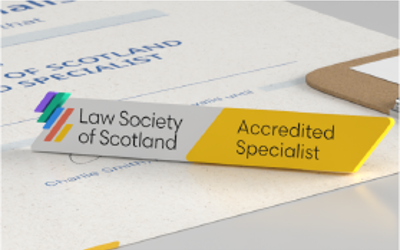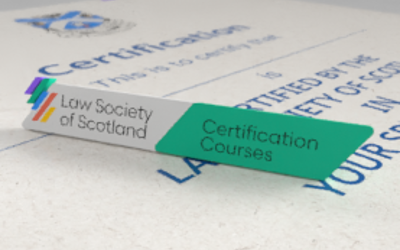Our accreditation scheme recognises solicitors who demonstrate distinction in Personal Injury Law. It is a hallmark of excellence that peers and clients can trust.
Benefits of an accreditation in Personal Injury Law
- Progress your career faster
- Increase your profile within the industry
- Create potential for additional revenue streams through external referrals
Knowledge and application of the law
Applicants should demonstrate a high level of knowledge and experience in the area of personal injury law in Scotland. The application should include evidence the applicant has been engaged in a broad spectrum of work or practice in the personal injury field throughout the five year period under review. Examples provided in the application should demonstrate expertise at a high level and should include:
- Experience of a significant number of matters from across the following categories
- matters of complexity with a number of difficult and novel issues
- matters involving significant skill, time and labour on the part of the applicant
- matters involving specialised knowledge on the part of the applicant
- matters involving unusual circumstances or where the subject matter is important to the client
- matters involving significant value
- matters where the applicant has taken particular steps with a view to avoiding a dispute, resolving a dispute, limiting the matters in dispute or limiting the scope of any hearing including mediation
- An understanding of the tests for personal injury including the legal criteria for liability where deviation from normal practice is alleged
- An understanding of the issues of causation and quantification of damages in personal injury claims
- An understanding of the practices and procedures of the Scottish Courts in dealing with personal injury claims including Commercial Actions in the Court of Session
- Participation in relevant Law Society of Scotland committees or other bodies or contribution towards consultation papers within the specialism.
When considering the strength of the application, the panel will consider the:-
- the role of the applicant in the work outlined - whether the applicant was the lead or a relatively junior member of a team; and
- the complexity of the work – whether the examples cited involve work that is relatively straightforward, or involved novel or untested points.
The panel will award more credit where the applicant has demonstrated a leading role in a range of complex or novel matters, rather than crediting simple volume of work and/or dealing with fairly straightforward matters.
Knowledge and application of procedures
All applicants should demonstrate the breadth of their work in the field in their application. Examples of litigated work (whether in the Sheriff Court or in the Court of Session) and non-litigated work should be provided where available.
Applicants who have been engaged in the practice of personal injury law for the relevant five year period, whether for pursuer or defender, should be able to demonstrate a high level of working knowledge of the practical application of personal injury law by highlighting complex or novel cases they have been involved with.
Applicants should highlight any relevant qualifications gained, training received, and courses attended during the five year period.
Knowledge sharing
Personal injury law is constantly developing and credit will be given where applicants have been engaged in knowledge sharing for the benefit of their peers. Applicants should therefore provide any available evidence of presenting seminars, teaching, responding to government consultation, and writing materials on personal injury law topics.
Next steps

Becoming an Accredited Specialist
Find out what you need to do to become an accredited specialist.

Apply now
Log in to complete the application form

Contact us
Have a question regarding accreditation? Contact us here

Clients want and deserve specialist advice when going through one of the most life changing of events such as a relationship breakdown, separation and divorce. Family Law is a rich, sometimes complicated, speciality deploying good legal knowledge as well as excellent people skills. It’s also an area that’s hard work.
When setting up the North East’s first specialist family law practice, accreditation as specialists in family and child law helped Patience and Buchan stand out from the crowd. Since then, it’s remained an important part of our business – encouraging our solicitors to pursue accreditation as part of their career development and providing clients with specialist advice in family and child law and offering family mediation.
The Law Society’s accreditation system rightly recognises those lawyers who are proven experts in their field of accreditation whether that’s family law, child law or family mediation.

My practice often involves instruction in high value financial provision on divorce claims. Sophisticated clients are used to instructing specialist professionals in other disciplines. Increasingly such clients are attracted to Law Society accredited specialists when choosing their solicitor.
To achieve accreditation, solicitors have to demonstrate a high level of knowledge and experience in family law. They require experience at Sheriff Court and Court of Session level but should also be able to demonstrate a good track record of resolving cases extra-judicially. Many accredited specialists are qualified in Collaborative law or as family law arbitrators. Accreditation by the Law Society as a family law mediator can also be important.
I would highly recommend a career as a specialist family lawyer. There is no typical day in the office. The work in this area is varied, challenging, thought-provoking and rewarding.


